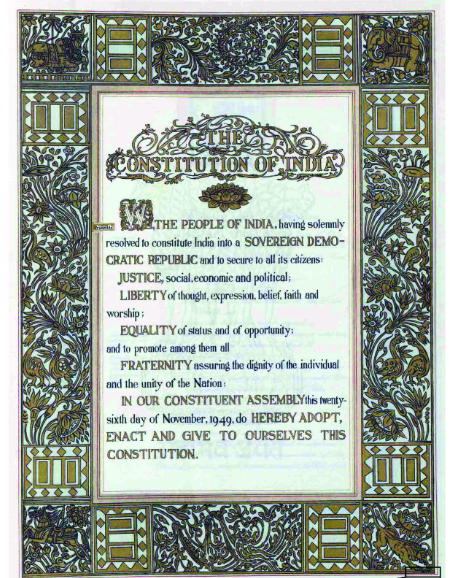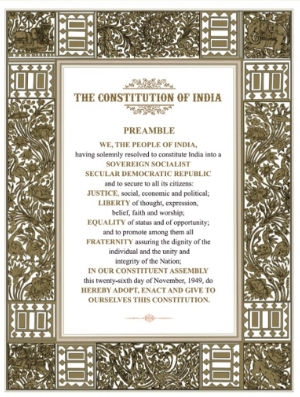Mini Constitution of Mrs. Indira Gandhi: The 42nd Amendment
OTHER


The Indian Constitution, adopted in 1950, has been the bedrock of our democracy, ensuring the fundamental rights and freedoms of its citizens. However, in 1976, the 42nd Amendment brought significant changes to the Constitution, most importantly the insertion of the terms "socialist" and "secular" into the Preamble. This amendment, introduced during a period of emergency under the leadership of Prime Minister Indira Gandhi, has been a subject of criticism and debate ever since.
The 42nd Amendment, often referred to as the "mini-constitution," was enacted during a tumultuous time in Indian politics. The emergency declared by Prime Minister Indira Gandhi in 1975 gave her government unprecedented powers, leading to concerns about the erosion of democratic values and the abuse of power. The 42nd Amendment was a deliberate attempt to consolidate power and suppress dissent.
One of the main reason for such critical evaluation of the 42nd Amendment is the manner in which it was passed. The amendment was rushed through Parliament after imprisoning all the opposition leaders without any debate or consultation with the opposition. This lack of democratic process raises questions about the legitimacy of the amendment and its impact on the democratic fabric of the country.
Furthermore, the insertion of the terms "socialist" and "secular" into the Preamble has been a subject of contention. The insertion of terms "socialist" and "secular" was unnecessary and ideologically driven. The Constitution already provided for these principles and the insertion of these terms was a political move to appease certain sections of society.
Another concern is the impact of the 42nd Amendment on the balance of power between the central government and the states. The amendment strengthened the central government's authority by giving it more control over state governments and reducing the autonomy of the states. This centralization of caused threat to the federal structure of the Indian Constitution.
Additionally, the 42nd Amendment introduced restrictions on the judiciary, limiting its independence and undermining the principle of separation of powers. These restrictions included changes to the appointment and removal of judges, which raised concerns about the politicization of the judiciary and the erosion of judicial independence.
It is important to recognize and critically analyze the amendments made to the Indian Constitution, especially during periods of political turmoil. The 42nd Amendment, enacted during the emergency, is an example of the need for vigilance and scrutiny to ensure that the fundamental principles of our democracy are upheld.
In conclusion, the 42nd Amendment of the Indian Constitution, introduced during a period of emergency under the leadership of Prime Minister Indira Gandhi, has been a subject of criticism and debate. The rushed manner in which it was enacted, the ideological motivations behind it, and its impact on democratic principles and federalism have all raised concerns. It is crucial to reflect on these issues and strive for a robust and inclusive democracy that upholds the values enshrined in our Constitution.


1950 में अपनाया गया भारतीय संविधान हमारे लोकतंत्र का आधार रहा है, जो अपने नागरिकों के मौलिक अधिकारों और स्वतंत्रता को सुनिश्चित करता है। हालाँकि, 1976 में, 42वें संशोधन के माध्यम से संविधान में महत्वपूर्ण बदलाव लाया गया, जिसमें सबसे महत्वपूर्ण रूप से प्रस्तावना में "समाजवादी" और "धर्मनिरपेक्ष" शब्दों को शामिल किया गया। प्रधान मंत्री इंदिरा गांधी के नेतृत्व में आपातकाल के दौरान पेश किया गया यह संशोधन तब से आलोचना और बहस का विषय रहा है।
42वां संशोधन, जिसे अक्सर "मिनी-संविधान" कहा जाता है, भारतीय राजनीति में उथल-पुथल भरे समय के दौरान लागू किया गया था। 1975 में प्रधान मंत्री इंदिरा गांधी द्वारा घोषित आपातकाल ने उनकी सरकार को अभूतपूर्व शक्तियाँ प्रदान कीं, जिससे लोकतांत्रिक मूल्यों के क्षरण और सत्ता के दुरुपयोग के बारे में चिंताएँ पैदा हुईं। 42वां संशोधन सत्ता को मजबूत करने और असहमति को दबाने का एक जानबूझकर किया गया प्रयास था।
42वें संशोधन के ऐसे आलोचनात्मक मूल्यांकन का एक मुख्य कारण इसे पारित करने का तरीका भी है। यह संशोधन विपक्ष के साथ किसी भी बहस या परामर्श के बिना सभी विपक्षी नेताओं को कैद करने के बाद संशोधन को संसद के माध्यम से पारित किया गया था। 42वें संशोधन को पारित करने के लिये लोकतांत्रिक प्रक्रिया की यह कमी संशोधन की वैधता और देश के लोकतांत्रिक ताने-बाने पर इसके प्रभाव पर भी सवाल उठाती है।
इसके अलावा, प्रस्तावना में "समाजवादी" और "धर्मनिरपेक्ष" शब्दों का सम्मिलन विवाद का विषय रहा है। "समाजवादी" और "धर्मनिरपेक्ष" शब्दों का समावेश अनावश्यक और विचारधारा से प्रेरित था। संविधान में पहले से ही इन सिद्धांतों का प्रावधान है और इन शर्तों को शामिल करना समाज के कुछ वर्गों को खुश करने के लिए एक राजनीतिक कदम था।
एक अन्य चिंता केंद्र सरकार और राज्यों के बीच शक्ति संतुलन पर 42वें संशोधन का प्रभाव है। संशोधन ने राज्य सरकारों पर अधिक नियंत्रण देकर और राज्यों की स्वायत्तता को कम करके केंद्र सरकार के अधिकार को मजबूत किया था। इस केंद्रीकरण से भारतीय संविधान के संघीय ढांचे को ख़तरा पैदा हो गया था।
इसके अतिरिक्त, 42वें संशोधन ने न्यायपालिका पर प्रतिबंध लगा दिए थे, इसकी स्वतंत्रता को सीमित कर दिया और शक्तियों के पृथक्करण के सिद्धांत को कमजोर कर दिया था। इन प्रतिबंधों में न्यायाधीशों की नियुक्ति और निष्कासन में बदलाव शामिल थे, जिससे न्यायपालिका के राजनीतिकरण और न्यायिक स्वतंत्रता के क्षरण के बारे में चिंताएँ बढ़ गईं।
खासकर राजनीतिक उथल-पुथल के दौरान भारतीय संविधान में किए गए संशोधनों को पहचानना और उनका आलोचनात्मक विश्लेषण करना महत्वपूर्ण है। आपातकाल के दौरान अधिनियमित 42वां संशोधन, यह सुनिश्चित करने के लिए सतर्कता और जांच की आवश्यकता का एक उदाहरण है कि हमारे लोकतंत्र के मौलिक सिद्धांतों को बरकरार रखा जाए।
निष्कर्षतः, प्रधानमंत्री इंदिरा गांधी के नेतृत्व में आपातकाल के दौरान पेश किया गया भारतीय संविधान का 42वां संशोधन आलोचना और बहस का विषय रहा है। जिस जल्दबाजी में इसे अधिनियमित किया गया था, इसके पीछे की वैचारिक प्रेरणाएँ और लोकतांत्रिक सिद्धांतों और संघवाद पर इसके प्रभाव ने चिंताएँ बढ़ा दी हैं। इन मुद्दों पर विचार करना और एक मजबूत और समावेशी लोकतंत्र के लिए प्रयास करना महत्वपूर्ण है जो हमारे संविधान में निहित मूल्यों को कायम रखता है।
